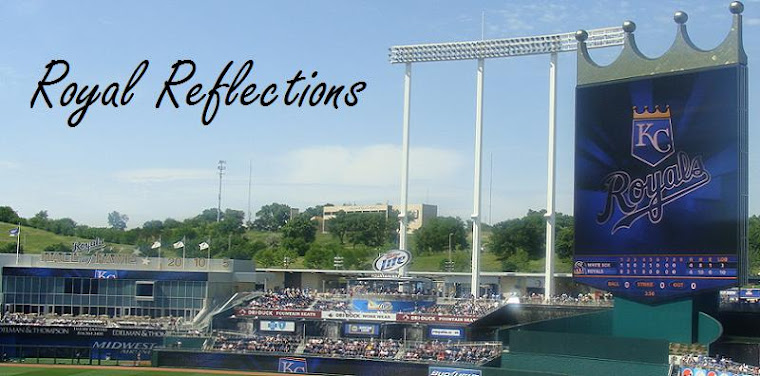What an odd year 2008 was for the Royals. We were 16-14 during Spring Training and then started the regular season with a sweep, on the road, in Detroit and that set the bar quite high, even though Royals fans knew it was probably too high.
The Royals finished the season with a 75-87 record, thanks largely to an explosive September in which they were 18-8 (the best record in the Major Leagues for the month). Before the season I predicted a 77-85 record and I predicted a fourth place finish. Both predictions turned out pretty well, but I also predicted that the Twins would finish behind the Royals and that the Indians would win the division.
David DeJesus missed the first couple of weeks with an injury he sustained in the first game and Joey Gathright took over in center. That fueled a discussion among fans that started in Sprint Training about which player should be the starter in centerfield. I wrote a post comparing the two players in late March and concluded that while Gathright has value, DeJesus should be the every day starter.
The first loss of the season came on April 4 against the Twins. John Bale, who opened the season in the rotation, got the loss. Bale didn't last long in the rotation. By April 15, he was 0-3 with a 7.63 ERA. He complained about a dead arm after his April 15 start and he headed to the DL. Then in early May, he wasn't happy about his progress, so he punched a door and broke his pitching hand. He didn't return until September. Trey Hillman put him in the bullpen and he didn't give up a single run in ten outings.
Brian Bannister got off to a red hot start, winning his first three starts. He headed into Oakland on April 18 with a 3-0 record and a 0.86 ERA. He was hit hard that game and he lost six of his next seven starts. He never really got back on track. At one point, he went from June 23 until September 14 without a win. He did win two of his final three starts though.
Zack Greinke came into his own in 2008. He won his first three starts and he never looked back. He seemed comfortable on the mound and he seemed confident in his stuff. For long stretches of the season, he was the ace of the staff. The only down month he had was August (the month the Royals really struggled as a team), but he finished with a flurry, winning four of his five starts in September and running his record to 13-10 for the season with a 3.47 ERA.
Gil Meche got off to an awful start, winning just one game in April. He struggled through May, and finally found his stride by mid-June when he won his final three starts of the month. From there, he got progressively better. By the end of July he was 9-9 with a 4.22 ERA. By the end of August he was 10-10 with a 4.07 ERA. And he finished with a 14-11 record and a 3.98 ERA. Meche has now turned in two solid seasons in the Royals rotation and thankfully he's still under contract for three more years.
By late May, life was getting difficult for the Royals.
Billy Butler was struggling so bad that he was sent to Omaha at the end of the month. At the time, he was hitting .263 with 1 HR and just 11 RBI. Butler came back in late June and struggled through July (hitting just .221 for the month). He finally got things going in August (he hit .330 for the month) and he went on to put up mediocre numbers for the season: .275 AVG, 11 HR, 55 RBI.
Also by late May we were treated to Jose Guillen’s beautiful disposition as he made his infamous there are “too many babies here” comment about players who, in his opinion didn’t know how to play that game the right way, in spite of the fact that he himself showed a lack of effort on multiple occasions. Later in the season he yelled at fans, talked about not wanting to play at home, knocked a chair over in the locker room in front of a coach after exchanging words with him, and various other things we’ve come to expect. Yeah, he put up the numbers (20 HR and 97 RBI), but by the time the trading deadline came, I was hoping the Royals would trade him—knowing that they wouldn’t.
By the end of May, the Royals put together a monumental losing streak (this time it was 12 games) and even the Kansas City Star was piling on. They ran a pole on their website that asked, “How will the Royals lose tonight?” Kyle Davies finally put an end to the losing streak on May 31, picking up his first win of the season in his first start. He didn’t lose until June 28 and he went on to have a good season at 9-7 with a 4.06 ERA.
As June began, the Royals were 22-34 and they were struggling offensively. So, Hillman decided to try Esteban German at shortstop, even though Mike Aviles was sitting on the bench. After the Royals lost to the White Sox on June 4, Hillman said this when questioned about Aviles’ lack of playing time: “There hasn't been a whole lot of opportunity for Mike Aviles,” Hillman conceded. “He only had one game. I’m accountable for that, but I’m going to go with the guy who gives us the best at-bats.” If only he had known.
Luke Hochevar appeared to turn things around in June with two wins to even his record at 5-5, but he only won one more game the rest of the season, before shutting things down in mid-August with an injury. He ended the season with a 6-12 record and a 5.51 ERA. Obviously, the Royals need more from him in 2009.
By mid-June our once strong bullpen was shaken after Leo Nunez got hurt. Jimmy Gobble’s ERA was over 8.00. Brett Tomko was awful—and eventually released. And Yasuhiko Yabuta had an ERA in the mid fives and was sent to Omaha. He didn’t return until September. But Ramon Ramirez was pitching fairly well and Ron Mahay was solid. And Joakim Soria was putting together the makings of a fantastic season. He went on to have one of the best seasons any closer has ever had in a Royals’ uniform, racking up 42 saves and posting an impressive 1.60 ERA.
Mike Aviles hit his first home run on June 12 against the Rangers. By the end of June he was hitting .330 with an OBP of .361. He also had three home runs and 15 RBI that month and erased any doubt about whether he could play every day at the Major League level. He went on to hit .325 with 10 HR and 51 RBI for the season. And you have to be excited about what Aviles could bring to the Royals line up for years to come.
Mark Teahen finally started driving the ball in mid-June. He ended up with five home runs for the month, but he drove in just 11 runs and he was hitting just .257. Hillman started moving Teahen around defensively and Teahen made errors in back to back games at first base against Texas, costing the Royals both games. Unfortunately, Teahen’s average dipped to .247 by the end of July and .244 by the end of August. He hit .313 in September to bring his season average up to .255. And he finished with 15 HR and 59 RBI—hardly the production numbers you expect from a corner outfielder who gets nearly 600 at bats.
Alex Gordon was really struggling by late June, hitting just .214 for the month. Things didn’t get much better for him in July. He hit just .226. He ended the season with very Teahen-like numbers: .260 AVG, 16 HR, 59 RBI. Again, hardly numbers to get excited about.
In spite of all the struggling in May and June, the Royals found interleague play to their liking and they put together a nice streak in which they won nine of out ten games to put them just 7.5 games out of first place in the AL Central.
By the end of July the Royals were 50-59 and riding high after pulling off a sweep in Oakland for the first time in 20 seasons. On August 1, Mark Grudzielanek suffered a nasty injury and unfortunately it ended his season and his career in Kansas City. He was a classy player for the Royals and let’s hope he lands a job somewhere next season if that’s what he really wants.
On August 4, the Royals defeated the Red Sox and pulled to within seven games of .500 (53-60). But then things got ugly. By August 28 they were 56-77, prompting Jeffrey Flanagan to write, “. . . hope has vanished. This team is a disaster. Again.”
September turned out to be the opposite of August. They started the month with a 57-79 record and ended the season with a 75-87 record, which is the best record they’ve had since 2003.
David DeJesus hit .388 for the month of September and was the one true constant in the lineup all season long. He finished with a .307 average, .366 OBP, 12 HR, and 73 RBI. You get the feeling that DeJesus has arrived and, assuming he isn’t traded, may put up better numbers for years to come now that he will no longer be hitting leading off.
The Royals finished the season by winning two out of three games in Minnesota and a promise from Dayton Moore that changes are coming—some of which have already occurred. I’ll be writing about those in the days to come.




No comments:
Post a Comment